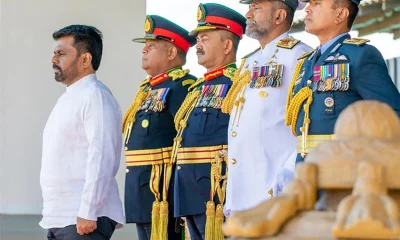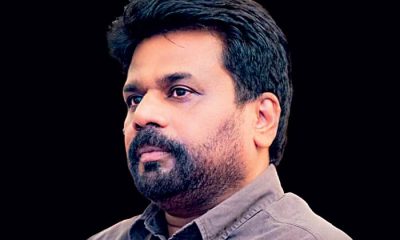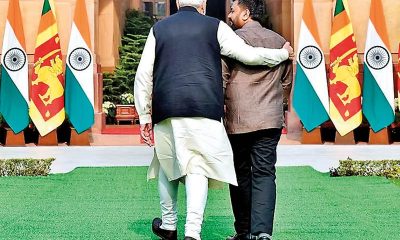Editorial
Hitler, Stalin and others

Wednesday 30th November, 2022
The Nazis of Sri Lanka (read the members of the current SLPP-UNP government, whose leader, President Ranil Wickremesinghe, has called himself Hitler recently in Parliament) have gone into overdrive to suppress democratic dissent. They invaded an auditorium at Hanguranketha, on Sunday, in a bid to sabotage a conference held by a group of SLPP dissidents. Thankfully, they failed in their endeavour.
The fact that the Sri Lanka police are functioning as the Sturmabteilung or Brown Shirts under the Third Reich in Germany, and the prevailing culture of impunity seem to have emboldened the Nazis here to unleash violence to intimidate their political opponents. The Hanguranketha attack presages trouble for democracy, the Opposition and the distressed citizens who are left with no alternative but to take to the streets.
What is up the government’s sleeve is not difficult to guess; even a female ruling party MP has warned that there will be attacks on the Opposition. State Minister Diana Gamage warned Opposition Leader Sajith Premadasa, the other day, in Parliament; she asked him to cancel a protest march to be held from Kandy to Colombo lest the people should set upon him on the way. The term, ‘people’, is a euphemism Sri Lankan governments use for their goons. One may recall that in the early 1990s, when some journalists covering a DUNF leaflet distribution campaign near the Fort Railway Station were attacked by a gang of UNP thugs, the then Minister of Defence D. B. Wijetunga claimed that ‘irate train commuters’ had assaulted the media personnel who were blocking the entrance to the railway station! We asked him, in this column, whether commuters carried firearms, swords, bicycle chains, and knives. President Ranasinghe Premadasa, who was in power at the time, may not have thought his beloved son would come under similar attacks by ‘people’.
The government has sought to justify the use of draconian laws such as the PTA (Prevention of Terrorism Act) to curb public protests on the grounds that political upheavals adversely impact tourism. If so, will the SLPP and the UNP explain why they resorted to street protests to engineer regime changes? The UNP held a large number of protests against the Mahinda Rajapaksa administration, and the SLPP unsettled the Yahapalana administration by means of mass protests. The UNP backed the Galle Face protest campaign to the hilt when Gotabaya Rajapaksa was the President. No sooner had Wickremesinghe been appointed the Prime Minister than he appointed a committee to look after the interests of the anti-government protesters!
Power cuts, scarcities of essentials, attacks on democracy and the exploitation of foreigners affect tourism more than peaceful protests do.
Political stability is no doubt a prerequisite for economic revival, but it cannot be achieved by suppressing public protests. Similarly, it is well-nigh impossible to overcome political instability while the people are undergoing economic hardships and demanding relief. The government must not only take action to stabilise the economy but also be seen to be doing so. Unfortunately, it is seen to be busy solving the problems of the Rajapaksa family, the SLPP, the UNP and their cronies! It also lacks legitimacy because it comprises the SLPP grandees who ruined the economy, and other failed leaders who were rejected by the people at the last general election for neglecting national security and mismanaging the economy.
There are some troublemakers hell-bent on plunging the country into chaos on the pretext of fighting for the rights of the people. They are the ones who carried out arson attacks, assaulted people and even killed an MP during anti-government protests in May and July. But that is no reason why the people’s fundamental rights should be curtailed. All violent elements that break the law have to be dealt with separately. Interestingly, President Wickremesinghe, who calls himself Hitler, has condemned anti-government protesters as Fascists! Some violent characters among protesters claim to be ‘students’. The government refuses to accept their claim. It does not seem to be aware that the terrorists who have ruined Afghanistan are also called ‘students’ or Taliban in Pashto!
Meanwhile, the unfolding politico-economic tragedy is not devoid of some comic relief. In the 1940s, Stalin had Hitler on the run. But, about seven decades on, here in this land like no other, we see ‘Stalin’ running like a rabbit with ‘Hitler’ in hot pursuit! General Secretary of the Ceylon Teachers’ Union, Joseph Stalin, valiantly led mass protests against President Gotabaya Rajapaksa from the front, and was instrumental in engineering the collapse of the Rajapaksa regime, but today he is on the defensive, facing as he does harassment at the hands of the current dispensation. He has proved to be no match for Gotabaya’s successor, who calls himself Der Fuhrer; his bark is now worse than his bite.
Editorial
Rice woes persist

Saturday 28th December, 2024
The JVP-led NPP government has failed to carry out its promise to import rice due to some flaws in the process of preparing tenders. It has asked for some more time to bring in the promised rice from India. Private traders have already imported 72,000 MT of rice. The state sector stands exposed for its inefficiency.
Is it that the new government is not competent enough to carry out even a simple task like importing rice, which successive governments resorted to, as an ad hoc measure, to address the issue of escalating prices of rice, instead of taming the Millers’ Mafia? Why the incumbent administration has botched the process of tendering for rice imports defies comprehension. Has anyone scuttled the government’s import plan in support of the private sector importers, as alleged by the Opposition, and some consumer rights protection groups, which have called for a probe?
It has been pointed out in Parliament that the government is taxing imported rice at the rate of Rs. 65 a kilo and boosting its revenue instead of making a serious effort to make rice available at affordable prices vis-à-vis market manipulations by the Millers’ Mafia. The Opposition has alleged that some powerful millers are also among the rice importers, and they are getting the best of both worlds.
Close on the heels of the JVP-led NPP’s victory in the last presidential election, the owner of Araliya Rice, Dudley Sirisena, who is one of the wealthy millers blamed for manipulating rice/paddy markets and exploiting farmers and consumers alike, promised at a media briefing to ensure that there would be enough rice in the market at the then maximum retail prices stipulated by the Consumer Affairs Authority. The medium/small scale millers panicked and released all their rice stocks to the market, but the millers’ cartel did not do so and is now making the most of the artificially created rice scarcity to earn unconscionable profits.
The government, in its wisdom, increased the maximum retail prices of rice by Rs. 10 and played into the hands of the rice hoarders. As a result, the price of nadu rice has increased from Rs. 230 much to the glee of the powerful millers! The price of this particular variety of rice, which is popular among a majority of Sri Lankans, was about Rs. 180 before the 21 September presidential election.
President Anura Kumara Dissanayake and other JVP/NPP stalwarts have gone on record as saying that the country has produced enough paddy, and the rice shortage is due to hoarding, but the government has baulked at taking on the hoarders and is trying band-aid remedies.
The government has extended the deadline for rice imports until 10 Jan. 2025. The large-scale millers will ensure that more rice is imported before the commencement of the next harvesting period so that they can release some of their stocks, flood the rice market, bring down the prices of rice and exploit farmers by purchasing paddy at cheaper rates. Thereafter, they will hoard their paddy, causing the prices of rice to rise. They also leverage their influence derived from their financial prowess to delay bank loans for small/medium-scale millers so that the latter cannot begin purchasing paddy when harvesting commences.
Previous governments did not care to put an end to the powerful millers’ sordid operations, and the people expected the incumbent administration to be different due to its rhetoric and numerous promises. That is why they voted overwhelmingly for it in last month’s general election, enabling it to secure a two-thirds majority in Parliament. But the millers’ cartel with political connections and huge slush funds, continues to call the shots. Have the people been taken for a ride again?
Editorial
Good riddance!

Friday 27th December, 2024
A cascade of tectonic shifts triggered by the 2022 uprising or Aragalaya during the Gotabaya Rajapaksa government has reshaped Sri Lanka’s politics in such a way that more than 6,000 politicians have so far gone out of circulation, according to an election monitoring outfit. Executive Director of PAFFREL (People’s Action for Free and Fair Elections) Rohana Hettiarachchi has reportedly said those politicians were left with no alternative but to call it quits because they knew that they had absolutely no chance of re-election.
Among them are some prominent figures including political party leaders. This is not something the public bargained for. Those politicians were expected to remain active in politics until they went the way of all flesh. The news of their mass exit from politics must have gladdened many a heart, but the problem is that in this country the political flotsam and jetsam swept away by occasional giant waves like the one we witnessed last month are washed back ashore after drifting for years. There is also no guarantee that the newcomers to politics will be any better.
We have seen mountains in labour groan but deliver mice on several occasions during the past several decades. The current dispensation, which promised a revolutionary change in every sphere, has chosen to maintain the status quo; what we see on the economic front is a continuation of the policies and programmes of the previous regime to all intents and purposes. The JVP-led NPP made a solemn pledge to solve the problem of rice market manipulations, with a single stroke of the presidential pen.
But a cartel of millers continues to exploit farmers and consumers alike, and the government has opted for a shameful capitulation; it has restored to rice imports, which it vehemently condemned previous administrations for. The President’s pen has apparently run out of ink! There is hardly any difference between the new government’s foreign policy and that of the previous administration.
The Gotabaya Rajapaksa government was in the grip of a coterie of self-styled intellectuals, who banded together to form ‘Viyathmaga’, and grabbed key positions in the state sector following the SLPP’s electoral victories. They ruined that regime. The current administration is also swayed by a me-too version of ‘Viyathmaga’, and some of its members have been exposed for flaunting fake doctorates! Above all, it’s all hat and no cattle where the NPP’s promise ‘to catch thieves’ is concerned.
What has unfolded so far under the current administration is like a replay of the early stages of the Yahapalana and SLPP governments. It is hoped that the new leaders will care to bring about the revolutionary change they promised before the presidential and parliamentary polls so that their rule will not end up being something like a remake of an old movie or stage play with a new cast.
“Pity the land that needs a hero”, Brecht has famously said. Since Independence, Sri Lanka has been looking for heroes, fallen for the wiles of numerous bogus messiahs and seen many false dawns. Even a shaman succeeded in making a killing by selling an untested herby syrup, called Dhammika peniya, which was touted as a cure for Covid-19; he even duped some political leaders into swallowing it.
The news about the riddance of 6,000 politicians reminds us of an Aesopian fable, where a fox has one of its legs stuck in a rock crevice in a shallow stream. Having struggled to free itself but in vain, the poor creature is lying exhausted and covered with ticks when a small animal which happens to pass by offers to remove the ticks as it is not strong enough to do anything else.
The fox says the parasites had better be left untouched because they are already bloated and therefore cannot suck anymore blood, and if they are removed another colony of ticks will descend on it and bleed it dry.
Sri Lanka has been in the same predicament as the aforesaid fox all these years; successive governments have drained its Treasury dry with reckless spending and corruption. One can only hope that the new dispensation will be different. Hope is said to spring eternal.
Editorial
‘Swindlers List’

Thursday 26th December, 2024
Power not only corrupts but also makes the wielders thereof cherish the delusion that popular mandates are cartes blanches for them to do as they please and be above the law. This fact has been borne out by the despicable manner in which the President’s Fund has been misused, if not abused, under successive governments.
Thankfully, the President’s Fund is now under the microscope, and numerous questionable fund allocations have already come to light. It has been revealed that the Executive Presidents during previous dispensations arbitrarily allocated money from the President’s Fund to their kith and kin at the expense of the needy on the waiting list.
The JVP-led NPP government has released a list of politicians who have obtained money from the President’s Fund over the years in violation of the terms and conditions governing the provision of relief therefrom. All of them have obtained huge sums of money by leveraging their political connections, and those shameless characters include a tainted politician who fell off an upper-floor balcony of a hotel down under, over a decade ago, while trying to enter an adjoining room a la Spider-Man; he eventually got entangled in a web of lies of his own making.
Embroiled in an academic credentials scandal and unable to make good on its election promises and solve burning issues such as the shortages of rice and coconut and the soaring prices of essentials, the NPP government is all out to divert attention from its failure by carrying out propaganda attacks on the Opposition, which is on the offensive. However, the release of the Swindlers List, as it were, and the police probe into the misuse of the President Fund are most welcome. This has been an unintended benefit of the ongoing propaganda battle between the government and the Opposition.
As for financial assistance from the President’s Fund for patients, one of the conditions stipulated by law is that the family of the patient seeking relief is without adequate financial resources to meet the cost of surgery/treatment. It has also been specified that the monthly income of the family including the patient, spouse and unmarried children should not exceed Rs. 200,000, and a Divisional Secretary should recommend that the person concerned is eligible for financial assistance.
The President’s Fund relief scheme for patients was launched to provide financial assistance to low-income individuals who lack the means to bear the costs of medical treatment or surgery. It is therefore wrong for the President and/or the governing board of the Presidential Fund to grant funds to those who have the wherewithal to afford treatment or surgery either in this country or overseas.
Obviously, politicians who spend colossal amounts of money on their election campaigns and live the high life, residing in palatial houses, moving about in super-luxury vehicles, and travelling the world, are not eligible for financial assistance from the President’s Fund.
The CID is reported to have been called in to investigate the misuse/abuse of the President’s Fund. One cannot but agree with the incumbent government on this score although it is driven by an ulterior motive. One can only hope that the ongoing investigation will reach a successful conclusion, and legal action will be instituted against all those who are responsible for the misappropriation of state funds.
The Swindlers List submitted by the NPP government to Parliament is incomplete; it contains only the names of Opposition politicians. The public has a right to know how all Presidents have misused/abused the President’s Fund since 1978. Are there any individuals connected to the JVP or the NPP among those who have received financial assistance from the President Fund fraudulently, as claimed by Opposition MP Dayasiri Jayasekera, one of those exposed by the government?
Let Minister and Cabinet Spokesman Dr. Nalinda Jayatissa be urged to make public a complete list of beneficiaries of assistance from the President’s Fund instead of releasing names selectively to settle political scores. The NPP government, which is full of self-righteous members, should be able to do so if it has nothing to hide. It is hoped that the Opposition MPs who have not abused their political connections to obtain assistance from the President’s Fund will crank up pressure on the government to do so.
-

 Sports6 days ago
Sports6 days agoPathirana set to sling his way into Kiwi hearts
-

 News4 days ago
News4 days agoOffice of CDS likely to be scrapped; top defence changes on the cards
-

 Features4 days ago
Features4 days agoAn Absurd play in Parliament: Qualifications versus education
-

 Editorial6 days ago
Editorial6 days agoThe games they play
-

 Opinion5 days ago
Opinion5 days agoWhat AKD and NPP should bear in mind
-

 Midweek Review3 days ago
Midweek Review3 days agoEx-SLN seniors focus on seabed mining and Sri Lanka’s claim for the delimitation of the Outer Continental Margin
-

 Features6 days ago
Features6 days agoThe Government’s Term Tests & Results: The Good, the Bad and the Ugly
-

 Editorial5 days ago
Editorial5 days agoSeeyanomics, rhetoric and reality











